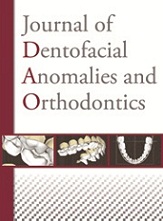Article contents
Occlusion and posture: facts and beliefs
Published online by Cambridge University Press: 20 October 2010
Abstract
The relationship between occlusion and posture has been a continual source of interest to all participants in the delivery of health care. But a certain amount of confusion still beclouds the subject because of the wide diversity of therapeutic approaches designed to deal with it and the weakness of methodological design in the scientific studies that have been published on it to date.
This article addresses the questions raised by that correlation between occlusion and posture as well as the therapeutic implications of a clinical approach integrating treatment of corporal posture into orthodontic care. A review of the literature shows that there is a dearth of reliable experimental data dealing with this subject. The data that is available points to the existence of this correlation and also asserts the prevalence of associations between idiopathic scoliosis and cranio-facial anomalies in adolescents.
The published facts appear to support our clinical impressions and subjective convictions. In order to enlarge our vision to encompass patients as entire human beings instead of compartmentalized biological segments each to be treated by an appropriate specialty it would be helpful if members of the various medical disciplines improved the lines of communication with each other. An equally desirable development would be the establishment of fundamental research and clinical programs that would help to establish causal relationships that would put therapy on evidence based foundation.
Keywords
- Type
- Research Article
- Information
- Journal of Dentofacial Anomalies and Orthodontics , Volume 11 , Issue 3: Posture , September 2008 , pp. 186 - 211
- Copyright
- © RODF / EDP Sciences
- 2
- Cited by




